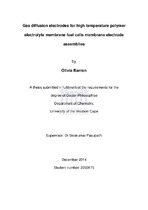| dc.contributor.advisor | Pasupathi, Sivakumar | |
| dc.contributor.author | Barron, Olivia | |
| dc.date.accessioned | 2015-07-28T11:57:17Z | |
| dc.date.available | 2015-07-28T11:57:17Z | |
| dc.date.issued | 2014 | |
| dc.identifier.uri | http://hdl.handle.net/11394/4323 | |
| dc.description | Philosophiae Doctor - PhD | en_US |
| dc.description.abstract | The need for simplified polymer electrolyte membrane fuel cell (PEMFCs) systems, which do not require extensive fuel processing, has led to increased study in the field of high temperature polymer electrolyte membrane fuel cells (HT-PEMFCs) applications. Although these HT-PEMFCs can operate with less complex systems, they are not without their own challenges; challenges which are introduced due to their higher operation temperature. This study aims to address two of the main challenges associated with HT-PEMFCs; the need for alternative catalyst layer (CL) ionomers and the prevention of excess phosphoric acid (PA) leaching into the CL. The first part of the study involves the evaluation of suitable proton conducting materials for use in the CL of high temperature membrane electrode assemblies (HT-MEAs), with the final part of the study focusing on development of a novel MEA architecture comprising an acid controlling region. The feasibility of the materials in HT-MEAs was evaluated by comparison to standard MEA configurations. | en_US |
| dc.language.iso | en | en_US |
| dc.publisher | University of the Western Cape | en_US |
| dc.subject | Proton conductor | en_US |
| dc.subject | acid-controlling region | en_US |
| dc.subject | Zirconium hydrogen phosphate (ZHP) | en_US |
| dc.title | Gas diffusion electrodes for high temperature polymer electrolyte membrane fuel cells membrane electrode assemblies | en_US |
| dc.rights.holder | University of the Western Cape | en_US |

